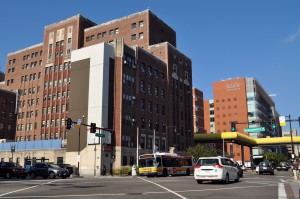
The National Institutes of Health awarded Boston University a $1.8 million Broadening Experience in Scientific Training grant, a prestigious award given to a total of seven institutions across the country, the BU School of Medicine announced Thursday.
BUSM plans to use the BEST grant to implement programs closely tied to the medical work force, tailoring its curriculum toward developing skills that employers are looking for, said Linda Hyman, associate provost for BUSM’s Division of Graduate Medical Science.
“It’s really about the importance of training the next generation of researchers, particularly in the field of biomedical research, and going beyond the traditional paradigm of training, which is to prepare students for careers in academics,” Hyman said. “The purpose of this grant is to recognize that many of our students will not go onto academic careers, but rather pursue careers in industry.”
The grant will span a total of five years, during which BU and other recipients will provide enhanced learning experiences and real world training to biomedical research students, said NIH Common Fund spokesperson Edmond Byrnes.
“A challenge in biomedical research training is the concern that the long training time and the declining percentage of PhD graduates that obtain independent academic research positions are making biomedical research a less attractive career,” Byrnes said in an email. “This program is designed to develop, test and disseminate novel training models that will change the face of biomedical research training.”
NIH’s process of administering the grants involved peer review of proposals sent to the organization from several higher education institutions, Byrnes said.
“The application from BU was well received by reviewers and had some novel approaches that, when implemented, should change training for their PhD students and postdoctoral fellows,” he said.
BU’s program will implement three basic strategies to reengineer traditional biomedical training and adjust the curriculum to accommodate these changes, Hyman said.
“The first part is working with our industry partners, the second is changing our curriculum and the third part is really working with the faculty to get them to better appreciate how this is an important thing to invest in, in terms of the future of their student training,” she said.
The program will work with faculty, as well as outside partners including the Massachusetts Biotechnology Education Foundation, Propel Careers and BU Alumni to discuss how to best prepare their students for the working world, said Barbara Schreiber, director of Graduate Studies in the department of biochemistry at BUSM.
“The whole idea here is to rethink this process with the understanding that the job market won’t support the number of trainees in academia, but that doesn’t mean there aren’t wonderful jobs out there,” she said. “We need to help our colleagues to understand what it is we have to do to help our trainees along the path to a successful career in science.”
Several BU students said the grant will likely improve biomedical programs at BU and offer more professional development to students.
Krystal Kallarackal, a sophomore in the College of Engineering, said large colleges such as BU would not run well without the help of grants from external sources.
“It gives students opportunities they wouldn’t normally have,” she said. “This is such a big school, and grants allow us to have better access to try different programs and allow for more networking.”
College of Arts and Sciences senior student Stephanie Bartley, who plans to go into a medical field, said she is glad BU is using its funding to invest in the student body.
“It’s important for BU to direct its funding toward students and research rather than other things that they have been investing in,” she said. “It’s really helpful to understand work after graduation.”
Scott Bourget, a freshman in CAS planning to study medicine, said it is important for BU to adapt to a changing biomedical workforce.
“Technology is constantly improving, and it’s getting to a point where we can’t keep up with the amount of technology we have in the different fields,” he said. “Getting programs together that help constantly improve what we’re doing as students helps us serve the people that we’re supposed to be helping in our careers.”






















































































































Herf Jones • Oct 6, 2014 at 4:31 pm
Great article!